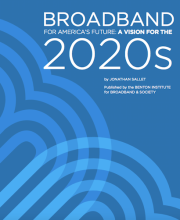Checking in With Fort Collins Fiber Network, Connexion- Community Broadband Bits Episode 408

After a bitter battle with Comcast and a successful referendum to reclaim local authority back in 2017, Fort Collins, Colorado, is moving forward with its municipal fiber network, Connexion. The city is starting to connect residents to the network, so we wanted to check back in with local activists and Connexion staff to find out how it's going. In this episode, Christopher interviews community advocates Glen Akins and Colin Garfield as well as Colman Keane, Connexion executive director, and Erin Shanley, Connexion marketing manager.
Glen and Colin discuss their grassroots organizing efforts from the 2017 referendum, and they share what it's like to finally watch the network being built. Colin, who has Internet access from Connexion now, describes the installation process for his new fiber service. The pair also tell Christopher how incumbent providers are reacting to the municipal network.
Speaking from the city's point of view, Colman and Erin explain how Connexion differs from other municipal networks, including that it faces competition from other broadband providers in Fort Collins. Christopher praises the city's decision many years ago to underground all utilities, and Colman tells Christopher how that has introduced challenges to the network fiber build. Erin shares how the Connexion is marketing services and engaging with the community, while keeping information away from competitors and staying mindful that the network isn't yet available citywide.
For more on Fort Collins and Connexion, listen to Community Broadband Bits Episode 211: Fort Collins Mayor on Fort Collins Fiber Future and Episode 282: Organizing for a Community Network, Against Big Cable
This show is 46 minutes long and can be played on this page or via Apple Podcasts or the tool of your choice using this feed.
Transcript below.
We want your feedback and suggestions for the show-please e-mail us or leave a comment below.
Listen to other episodes here or view all episodes in our index. See other podcasts from the Institute for Local Self-Reliance here.
Thanks to Arne Huseby for the music. The song is Warm Duck Shuffle and is licensed under a Creative Commons Attribution (3.0) license.


